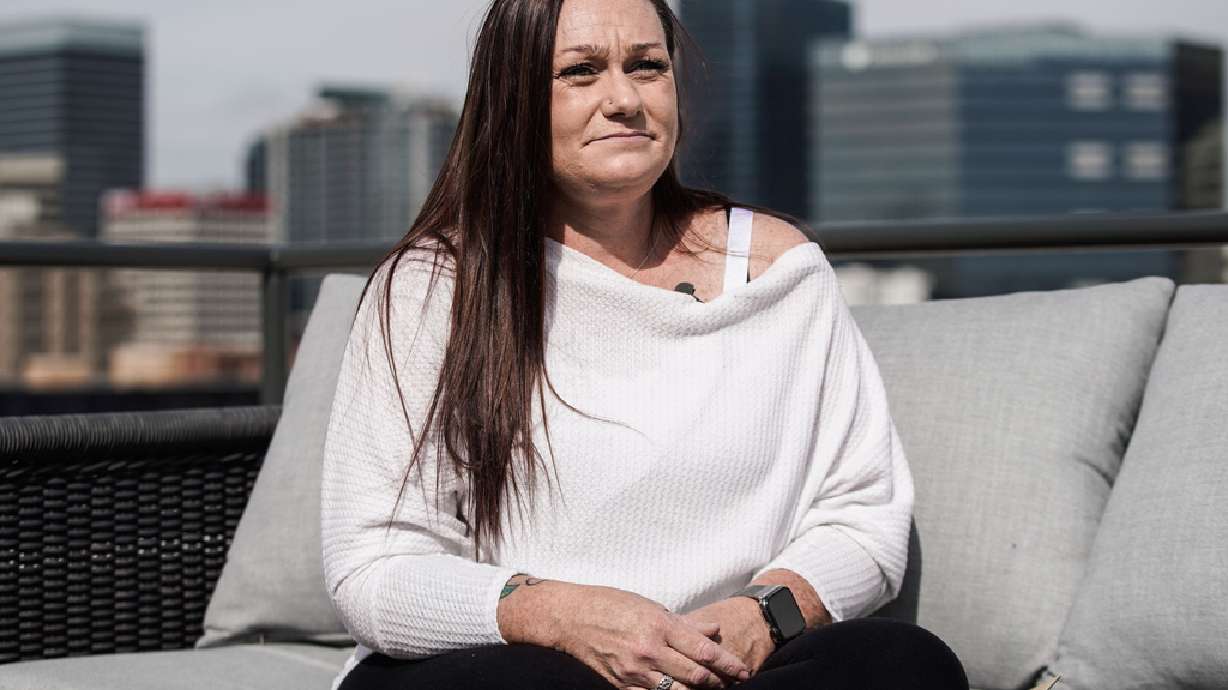Estimated read time: 4-5 minutes
This archived news story is available only for your personal, non-commercial use. Information in the story may be outdated or superseded by additional information. Reading or replaying the story in its archived form does not constitute a republication of the story.
SALT LAKE CITY — Although Utah is in the top 10 states for reported human trafficking cases, the state does not have programs to help survivors of trafficking get back on their feet, according to Petey McKnight. The Aspen House organization, for which McKnight serves as chairwoman of the board, was created to address this issue.
On Thursday, members of the Aspen House board, human trafficking survivors, and potential donors attended a luncheon on a rooftop in Salt Lake City to kickstart fundraising, with a goal to have Aspen House running by early 2023.
Aspen House, which is designed to mirror 57 other homes across the country, will provide a home for people recovering from trafficking situations.
McKnight said in 2019 there were 251 known victims of human trafficking in Utah; however, she says there are many more who are not known and human trafficking has "grown tremendously" in the last few years since that number was published.
Aspen House will house between eight and 12 women for two years while they work toward recovery. McKnight said 75% of graduates for programs like this around the county are back on their feet after the two years. She said there is a "huge need" for this in Salt Lake City, because survivors in the state do not have a lot of resources available to them.
Brittney Garcia, one of the members of the board who is a survivor of human trafficking, said this house will provide women with trauma counseling, addiction help, and job training, which are all important for recovery.
Garcia and her sister, Brandi Funk, were both being victimized at the same time, each in their early 30s. Both met a different man who they thought loved and cared for them but who was actually "grooming" them so that they could be trafficked. Even when they became aware of it, they were not able to get out of their situations until they separately got arrested and sought help.

The men were able to keep the women from going to police by getting them addicted to drugs, Garcia explained. She was addicted to heroin, and her trafficker used that as leverage so that she would keep working for him. Although Garcia got arrested for prostitution multiple times, she did not seek help until she had been trafficked for two years.
Funk said men involved as traffickers are smart; they know which women to target, what to tell them, and how to convince them that they need him. She said she felt controlled mentally and physically for a year and a half, until she finally went to a domestic violence center.
"You feel disgusting, you feel filthy, you feel like you're worth nothing. And then you get physically dependent on a drug that they're offering you. ... Every day is hell, every day of your life is hell when you're stuck in trafficking," Funk said.
Every day is hell, every day of your life is hell when you're stuck in trafficking.
–Brandi Funk
Funk said she was "very fortunate" to have a sister who had experienced it to show her that getting out is possible. Without her sister, she said recovery would have been a lot more difficult.
"It takes a long time to find your self-worth and realize that you can have a life after trafficking, that it is possible," Funk said.
Although Funk said she still has some hard days, at this point she feels like her life is together. Both of the sisters are involved in the board for the Aspen House as a way to help others.
The Aspen House, McKnight said, will help others find the camaraderie that Funk used to help her get out by connecting survivors with others who have been able to get out of their situations and become confident again.
Pamela Atkinson, who is also on the board, explained that human trafficking victims can be bullied at women's shelters or facilities for homeless. She said they are often called prostitutes and are not given sympathy, and they need their own place to be to help each other.

"That is why Aspen House is so important. Aspen House is going to give hope, and hope leads to healing as we all know," Atkinson said.
McKnight said they have raised about $75,000 for the project and have a goal of raising $2 million. If they are able to reach that goal, they will be able to purchase a home and fund the program for the next few years.
Ashlie Bryant, CEO and co-founder of 3Strands Global Foundation, spoke at the luncheon and said there are stories behind every face. She said that it hurts her to hear the stories of those who have survived human trafficking, but that the stories of these people are not over yet.
Bryant talked about the symbolism of the name for Aspen House, because aspen trees are a symbol of sustainability and interconnectedness. She said the Aspen House will alter the trajectory of multigenerational trafficking and help prevent others from having the same experiences.
"You took a leap of faith to start Aspen House and begin its story. Its walls will harbor safely so many other stories of those survivors who call Aspen House home, women whose lives will be forever changed because of a belief that stories can be changed, lives can have hope and dignity and respect," Bryant said.










